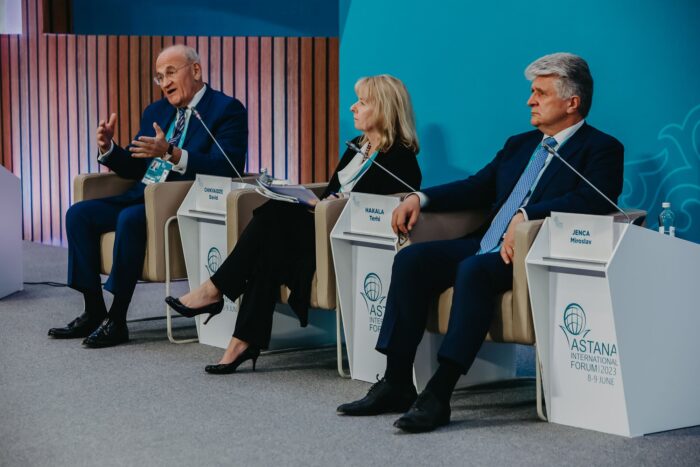ASTANA – The panel session Opportunities or Challenges: The UN’s Role in Ensuring Peace and Security at the Astana International Forum (AIF) examined the role of the United Nations in conflict prevention, given the rising confrontation and conflicts worldwide, as well as whether the organization needs to be reformed.

David Chikvaidze (Chef de Cabinet to the Director-General of the United Nations Office at Geneva (UNOG), Terhi Hakal (EU Special Representative for Central Asia), Miroslav Jenca (Assistant Secretary-General for Europe, Central Asia and Americas). Photo credit: AIF
During the session, Miroslav Jenča, UN Assistant Secretary-General for Europe, Central Asia and Americas, Terhi Hakala, European Union Special Representative for Central Asia, and David Chikvaidze, Chef de Cabinet to the Director-General of the United Nations Office at Geneva, shared their views with the audience. The session was moderated by Stephen Cole, a former journalist at the BBC.
Cole opened the discussion by quoting UN Secretary-General António Guterres, who said “we face an unprecedented number of crises. The tensions between major powers are at a historic high as are the risks of conflict through misadventure or miscalculation.”
He asked the speakers for their views about the recent suggestion by Guterres to reform the UN Security Council (UNSC) and Bretton Woods.
According to Chikvaidze, the reform is necessary because the immutable permanent members of the UNSC is an anachronism.
Cole asked Jenča if some reforms of the Security Council’s membership are necessary.
“The UN was created after the Second World War. The situation at that time was completely different. But the structures today are the same. So, definitely, reform is not only needed, it is long overdue,” said Jenča.
He added that dialogue with the UN as a platform for such discussion is necessary to rebuild trust in the world, noting that a record number of heads of state and governments are expected at the next UN General Assembly session in September.
Moderator Stephen Cole pointed out that the Security Council’s permanent membership hasn’t changed since 1946. China is the only Asian member. He asked the EU Special Representative for Central Asia what kind of reform is required.
According to Hakala, the veto power of the five permanent members is a big problem, as the UN must ensure dialogue between all countries.
The speakers were asked if the Security Council can be considered legitimate if it is seen as a forum primarily dominated by Western powers, which excludes Global South countries.
According to Chikvaidze, the updated Security Council should include 35 members, made up of the G20 countries, the African Union, and 14 countries from each of the five regions.
Chikvaidze urged to begin reform as soon as possible. “I think that we are actually at the beginning of a third world war,” he warned.
Jenča noted the problem of representation in the UN Security Council, as India, African and Latin American countries are marginalized. He also emphasized the importance of the political will to adhere to international law by the states.
The participants also discussed how to address the fact that the relationship between the three biggest powers – the United States, China, and Russia – has never been as dysfunctional as today.
According to Jenča, the world is in danger of a nuclear war, and this should be addressed by finding ways to commit to not using nuclear weapons. In his view, UN offices and mediation need to be utilized better.
He proposed that greater interaction between the UN Secretariat and member states is crucial.
“The member states are waiting for the Secretary-General to come up with initiatives. The new agenda for peace is not just a piece of paper prepared at the UN Secretariat, but it is a process of consultations with member states and with regional groups. We hope that eventually we will find a way in the future to change the deplorable situation we are in now,” Jenča said.
All the experts agreed that global challenges require global solutions.
“Kazakhstan has actively supported the UN and made difficult commitments, including denuclearization. Central Asia is now a nuclear-free zone,” Jenča said, also noting Kazakhstan’s efforts to address climate change and build a green economy.
Chikvaidze concluded the session by stating that the world needs to rebuild trust more than ever today.
